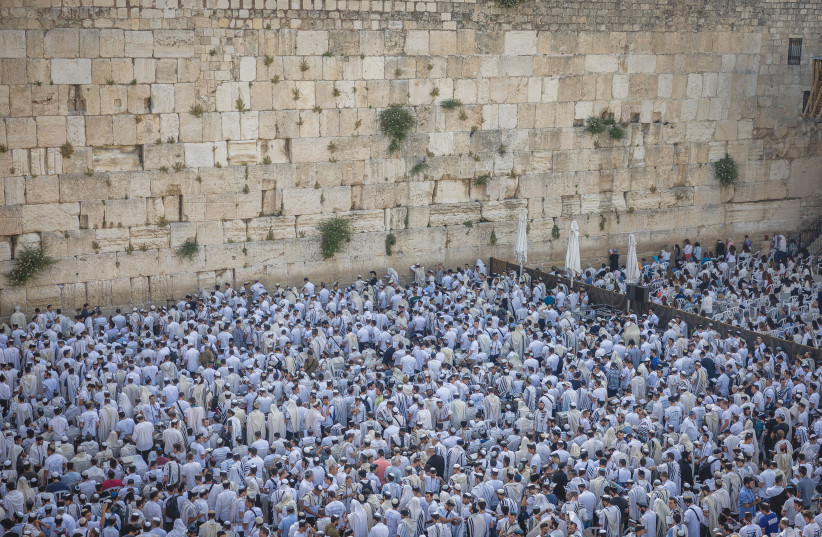Amid the outrage toward the new government’s wish to cancel the “Grandfather Clause” and make those who underwent a Reform conversation ineligible for aliyah, I want to discuss many of the terms associated with this controversy in an attempt to point out that this is nothing more than a shouting match between two sides who have no ones best interests in mind – maybe not even their own.
What I am talking about are the terms “Orthodox,” “Conservative,” and “Reform.” They are put in quotes because they lack any real meaning in the greater context of the history of the Jewish people. Why? They are nothing more than a product of exile – no more Jewish than bagels and lox, existing only because our people, those observant and not, decided to recreate something inauthentic to our tradition.
Prior to the emancipation of Jews living in France and Germany in the mid-1800s, there existed no denominations of Judaism. In fact, 100 years prior the term “Jew” did not even exist. Only those born into what we know as the Jewish tradition were considered Jews, irrespective of their level of adherence to Halacha (religious law).
This is because the collective tradition of the Jewish people, commonly referred to as Judaism, is not actually a religion. As opposed to religions such as Christianity or Buddhism, you cannot just become a Jew. This is best illustrated in the following example:
A person born into a Christian or Buddhist family that decides to reject either Christ as their savior or Buddha’s teaching as their spiritual guide is no longer a Christian or Buddhist. They can either decide to become an atheist or take on another religion that they believe in. For Jews? If someone is born into a Jewish family, it does not matter if they completely reject the tradition and lack belief in God, they will still be Jewish. That’s why there are atheists and there are Jewish atheists – once you are a Jew you’re always a Jew.

What does Judaism mean?
So what is “Judaism?” Our collective tradition is an ethnic peoplehood encompassing a common tradition rooted in the Torah and the Land of Israel; it’s an oral and written tradition passed down unchanged from generation to generation for over 3,000 years. Indeed, any efforts to change or amend the tradition have been promptly squashed. So if you asked a non-observant Jew 500 years ago living in Russia what they are; whether a Russian, Israelite (as we were called then), reform, conservative, atheist or anything else, they would promptly tell you they are just an Israelite (Jew).
Today, it is much different. From both ends of the spectrum, with the Reform trying to annul kashrut (Jewish dietary laws) and the Orthodox imposing a completely foreign dress code and way of life on its adherents, each side is trying to make our tradition into something it’s not. Where do these terms come from?
Where do they come from?
As Christians began to see their religious obligations differently, they set out to create a new way of faith. As such, denominations such as Orthodox and Reform churches sprung to life. This is because, as stated earlier, these are religious, not ethnic identities. Therefore, they can easily be mended and molded to any adherents’ beliefs or desires.
FOLLOWING EMANCIPATION in Europe, for the first time in history Jews, began to take on nationalist identities alongside their ethnic ones. They became “French Jews” or “German Jews.” Now becoming more accepted into the broader society, those less observant sought ways to maintain their ethnic identity without compromising their national one.
From this sprung the Reform Movement and a near complete disassociation from the tradition that our people maintained for the previous 2,800 years. To make this even more clear, the first celebration of rabbis graduating from the Hebrew Union College, a reform rabbinical school in America, featured a non-kosher menu and one of the Reform Movements founders famously declared “Berlin is the new Jerusalem.”
As a reaction to this outward affront toward their precious tradition, Torah-observant Jews likewise sought to separate themselves and began labeling themselves as “Orthodox,” taking on extra preventative measures such as 17th-century Polish wear as their common dress and an abhorrence to all other culture in an attempt to avoid the outcome that had befallen their reform brothers and sisters. Along the way, the Conservative Movement sprung up somewhere in the middle to try to attract those finding both sides too extreme in their deviance.
To be certain, this was occurring only in Eastern and Western Europe. Jews living in Mizrahi countries such as Yemen, Morocco, or Tunisia had no idea that this was going on. That is why even today these terms are relatively appalling to those who spent Exile in Mizrahi countries. Of course, this does not apply to all Mizrahim, as many of the Exilic customs of Ashkenazim, such as dress have been adopted by them – famous Rabbi Manitou once pointed out the obvious saying they are just “[selling] out to Ashkenazi Haredim.”
To make it clear, the denominations we know today and their customs are nothing more than a byproduct of thousands of years of brutal exile and collective trauma that may have required many of these measures at the time. What we recognize today as Reform and Orthodox are nothing more than a colonized identity that unfortunately has become mainstream.
What are the negative effects?

However, all of this becomes ever more troubling when we realize that many of these colonized practices are still alive and well in Israel today. Whether walking through Mea She’arim in Jerusalem or reading about attempts to push Israelis away from traditional practices, both extremes seem intent on imposing their anti-traditional ways upon the entire collective. Indeed, it is arguably worse coming from the “Orthodox” or what is referred to as Haredim in Israel, as they are the ones who on the surface appear to be the group upholding the tradition, even as there is nothing traditional about them.
THE NEGATIVE results of this colonization are abundantly clear today – we have a situation in which there are millions of Orthodox adherents who either completely forgo the unique opportunity of our generation to live in the modern State of Israel or those in Israel who refuse to recognize the inherent holiness and value in the fact that for the first time in 2,000 years there is a sovereign Jewish nation in the land of Israel, something that has been prophesied and prayed for by millions prior.
The result is multitudes going “off the Derech” or creating a new denomination called “Modern Orthodoxy.” In every case the damage is widespread.
As to those being Reform, they likewise are attempting to skew our collective history in an already failed mission to rid our people of the Halachic tradition in exchange for complete assimilation among the nations, foolishly thinking that by adopting the practices of actual religions or peoples it will somehow eliminate our collective traumas and woes. In essence, attempting to trade our peoplehood for some manufactured “religion” that neither their fathers nor their fathers’ father practiced before them.
As such, the outrage as to whether Reform or Orthodox conversions should be accepted for aliyah is completely misplaced – there is no conversion to become a Jew. Converting, or giyur, is a spiritual undertaking whereby the convert changes themselves completely, declaring themselves to be a new person altogether – one who decides to keep all the mitzvot in the traditional way, and who stripes themselves of all their past practices.
Surely, the Torah is clear that there is one law for both, the native and convert alike. Just saying a blessing and jumping in the mikveh does not accomplish this sacred task.
So where do we go from here? For starters, we can work to reject both colonized identities as they do not reflect the tradition of our people and history. This requires deep introspection into how we got here and what is required to move past it. This will be difficult as rabbis and leaders from both sides are surely not open to relinquishing power and control over their adherents. There is, however, a guide to follow.
The group that represents our tradition today mostly are the dati leumi, or religious nationalists. They have held onto our collective tradition while also living life. What I mean by this is that if you walk around Israel today, you will see a plethora of people dressing however they want, working where they want, fighting valiantly in the army – they just happen to be wearing a kippah, some wearing tzitzit.
What makes them the most authentic? It’s that they are embodying our historical tradition while also embracing the beauty of life around them – this is something special about the Judaism you see on a day-to-day basis in Israel. It’s a recognition that there is only one Judge in the world and to not worry about what others think about you. This is being authentic. This is being Jewish – not anything domination tells you.
The writer, a Jerusalem Post staff member, is an entrepreneur and Hebrew thinker, known as Osher in Hebrew. A recent oleh, he also helps oversee the start-up ecosystem in Jerusalem with Made in JLM. Follow him on Twitter: @troyfritzhand.
